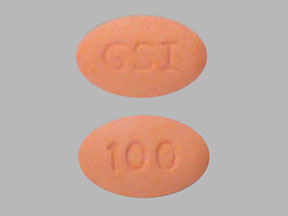Zydelig Disease Interactions
There are 7 disease interactions with Zydelig (idelalisib).
- Colitis
- Dermatologic toxicities
- Hepatic impairment
- Infections
- Intestinal perforation
- Neutropenia
- Lung toxicity
Idelalisib (applies to Zydelig) colitis
Major Potential Hazard, Moderate plausibility. Applicable conditions: Colitis/Enteritis (Noninfectious), Diarrhea
Severe diarrhea or colitis have been reported in patients treated with idelalisib. It is recommended to avoid concurrent use of idelalisib and other drugs that cause diarrhea. Care should be taken when using this agent in patients with diarrhea or colitis.
Idelalisib (applies to Zydelig) dermatologic toxicities
Major Potential Hazard, Moderate plausibility. Applicable conditions: Dermatitis - Drug-Induced
Fatal cases of severe cutaneous reactions, including Stevens-Johnson syndrome (SJS) and toxic epidermal necrolysis (TEN) have occurred in patients treated with idelalisib. It is recommended that if SJS or TEN is suspected to interrupt therapy until the etiology of the reaction has been determined, and if SJS or TEN is confirmed to permanently discontinue treatment with idelalisib. Monitor patients for the development of severe cutaneous reactions and discontinue idelalisib if clinically appropriate.
Idelalisib (applies to Zydelig) hepatic impairment
Major Potential Hazard, Moderate plausibility. Applicable conditions: Liver Disease
Fatal and/or serious hepatotoxicity have been reported in patients treated with idelalisib. Monitor ALT and AST in all patients as clinically appropriate. Patients with baseline hepatic impairment should be monitored for signs of idelalisib toxicity and dose modification with idelalisib should be made accordingly. It is recommended to monitor weekly for liver toxicity if the ALT or AST rises above 3 times the upper limit of normal until resolved and withhold therapy with idelalisib if the ALT or AST is greater than 5 times the upper limit of normal, and continue to monitor AST, ALT and total bilirubin weekly until the normal levels are attained. Discontinue idelalisib for recurrent hepatotoxicity and to avoid concurrent use with other drugs that may cause liver toxicity.
Idelalisib (applies to Zydelig) infections
Moderate Potential Hazard, Moderate plausibility. Applicable conditions: Infection - Bacterial/Fungal/Protozoal/Viral
Fatal and/or serious infections, including pneumonia, sepsis, febrile neutropenia, Pneumocystis jirovecii pneumonia (PJP) or cytomegalovirus (CMV) have been reported in patients treated with idelalisib. It is recommended to monitor patients for signs and symptoms of infection and to interrupt therapy with idelalisib for Grade 3 or higher infection. Consider prophylaxis for PJP in patients at risk and interrupt therapy in patients with suspected PJP infection of any grade, and permanently discontinue treatment if PJP infection of any grade is confirmed or interrupt idelalisib in the setting of positive CMV PCR or antigen test until the infection has resolved. If therapy is subsequently resumed, patients should be monitored (by PCR or antigen test) for CMV reactivation at least monthly.
Idelalisib (applies to Zydelig) intestinal perforation
Moderate Potential Hazard, Moderate plausibility. Applicable conditions: Gastrointestinal Perforation
Fatal and serious intestinal perforations have been reported in patients treated with idelalisib, some patients reporting moderate to severe diarrhea at the time of perforation. Advise patients to promptly report any new or worsening abdominal pain, chills, fever, nausea, or vomiting. Discontinue therapy with idelalisib permanently in patients who experience intestinal perforation.
Idelalisib (applies to Zydelig) neutropenia
Moderate Potential Hazard, Moderate plausibility. Applicable conditions: Bone Marrow Depression/Low Blood Counts
Cases of neutropenia have been reported with the use of idelalisib. It is recommended to monitor blood counts at least every 2 weeks for the first 6 months of therapy, and periodically thereafter. Care and close monitoring is recommended.
Multikinase inhibitors (applies to Zydelig) lung toxicity
Moderate Potential Hazard, Moderate plausibility. Applicable conditions: Interstitial Pneumonitis, Pulmonary Impairment
The use of certain multikinase inhibitors has been associated with pulmonary toxicity. Serious cases of interstitial lung disease (ILD), including fatal cases and interstitial pneumonitis or pulmonary fibrosis have been reported. Caution is recommended when using these agents in patients with a history of interstitial pneumonitis or pulmonary fibrosis or those patients presenting with acute onset of new or progressive unexplained pulmonary symptoms such as dyspnea, cough, and fever pending diagnostic evaluation. If ILD is confirmed, these agents should be permanently discontinued and appropriate measures should be instituted. Treatment should be immediately withheld in patients diagnosed with ILD/pneumonitis and permanently discontinued if no other potential causes of ILD/pneumonitis have been identified.
Switch to professional interaction data
Zydelig drug interactions
There are 906 drug interactions with Zydelig (idelalisib).
Zydelig alcohol/food interactions
There is 1 alcohol/food interaction with Zydelig (idelalisib).
More about Zydelig (idelalisib)
- Zydelig consumer information
- Check interactions
- Compare alternatives
- Pricing & coupons
- Reviews (2)
- Drug images
- Side effects
- Dosage information
- Patient tips
- During pregnancy
- FDA approval history
- Drug class: PI3K inhibitors
- Breastfeeding
- En español
Related treatment guides
Drug Interaction Classification
| Highly clinically significant. Avoid combinations; the risk of the interaction outweighs the benefit. | |
| Moderately clinically significant. Usually avoid combinations; use it only under special circumstances. | |
| Minimally clinically significant. Minimize risk; assess risk and consider an alternative drug, take steps to circumvent the interaction risk and/or institute a monitoring plan. | |
| No interaction information available. |
See also:
Further information
Always consult your healthcare provider to ensure the information displayed on this page applies to your personal circumstances.


